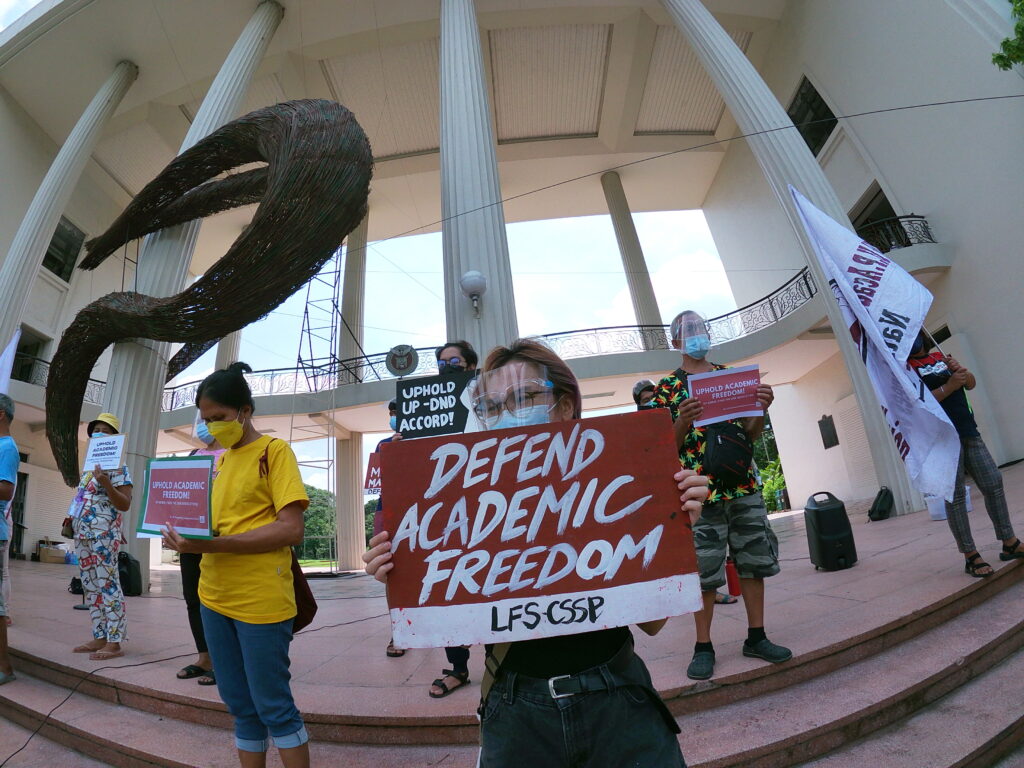On September 3, Defend UP Network led a protest in front of Quezon Hall in UP Diliman urging the Board of Regents (BOR) to adopt a resolution to defend academic freedom amid the continuing unilateral abrogation of the University of the Philippines and Department of National Defense (UP-DND) Accord.
The group said it would be a disservice to the UP community “to not be at the forefront” of defending academic freedom.


Sectoral regents including the Student Regent, Faculty Regent, and Staff Regent drafted the said resolution which aimed also to address issues on campus militarization, as well as the state-perpetrated harassment like red-tagging.
However, the resolution has yet to see progress after it was proposed on January 27 this year. More than eight months after, the Technical Working Group [TWG], composed by BOR members, convened for the first time to discuss the resolution.
“While we abhor the mootness of the DND dialogue in reinstating the UP-DND Accord, we are not withdrawing our fight to defend UP. We hope that through this TWG, the BOR members — UP President Danilo Concepcion, Alumni Regent Laserna, Regent Laurel, and the sectoral regents will heed the demands of the community,” said Andrew Ronquillo, Defend UP Network Convenor and Safety and Security Councilor of the UP Diliman University Student Council.
The DND decision drew flak from various academic institutions, teachers, youth, lawyers, rights groups and even politicians.
Apart from the BOR, the highest policy making body of UP, actions to institutionalize the UP-DND Accord were also taken in both houses of Congress.
On May 17, the House Committee on Higher and Technical Education held initial deliberations on the three bills—House Bills 8437, 8514, and 8545—that would institutionalize the UP-DND Accord. A TWG was created to reconcile the three bills. The consolidated version of the bill was passed by the committee in early June, seeking to include the terminated accord into Republic Act 9500, the UP Charter.
Also as early as January, Senate Bill 2002 was also filed to institutionalize the essence of the UP-DND accord, also seeking to include the annulled agreement into the UP Charter.
Meanwhile, DND stood pat on its decision and said the accord’s annulment on their side is final.

UP-DND Accord mutual inception and unilateral abrogation
Amid the pandemic and varying iterations of lockdown, the UP-DND Accord was terminated by DND Secretary Delfin Lorenzana on January 15, 2021. The reason he provided was the recruitment of UP students to the Communist Party of the Philippines and the New People’s Army. He further said the agency would review and terminate similar agreements with other universities.
The move surprised the UP administration, denying Lorenzana’s allegations and wondering how a mutual agreement can be shelved one-way all so sudden. Others thought the abrogation was timed when the students were away and cannot protest what is perceived as a threat to academic freedom.
“The UP system ensures its uncompromising efforts to fight for their fundamental rights and welfare. Now, more than ever, we are called upon to unite and struggle for the defense of UP. We will not let another Donato Continente suffer in the hands of this fascist state,” Defend UP Network said.
Continente was a staff of the Philippine Collegian who had been abducted on the night of June 16, 1989 at Vinzons Hall in UP Diliman to confess to the killing the Col. James Nicholas Rowe, who was then chief of the Joint U.S. Military Advisory Group (Jusmag). Continente was said to be subjected to inhumane treatment, with evident physical and psychological torture.
The UP-DND Accord was signed 14 days after the incident so such incident will never happen again. Then-UP President Jose Abueva and then-DND Secretary Fidel Ramos signed the accord.
It was an update of the accord between then-League of Filipino Students Chairperson Sonia Soto and then-Defense Minister Juan Ponce Enrile in 1982, then still under the rule of Ferdinand Marcos and a de facto martial law despite the dictatorship declared lifted on
Both accords provided guidelines on military and police presence and the conduct of operations on campus.
The UP-DND Accord banned police and military from entering the premises of any UP campus without prior notice except in cases of hot pursuit and similar occasions of emergency. The police and military were also prohibited interfering with peaceful protests actions by UP constituents.
The arrest or detention of any UP student, faculty or personnel shall also be reported immediately to the UP president, chancellor or dean. Also, UP should be informed of any search or arrest warrant on any student, faculty or employee and such warrants shall also be served with the presence of at least two faculty members designated by UP officials.
The UP Office of the Student Regent (OSR) asserted that UP must remain as a safe space for critical thought, discourse, and speech.
“[T]o continue critically examining social ills and building creative solutions for the Filipino people, UP’s academic community must enjoy the greatest academic freedom, without fear of retaliation and persecution,” the OSR said.





























